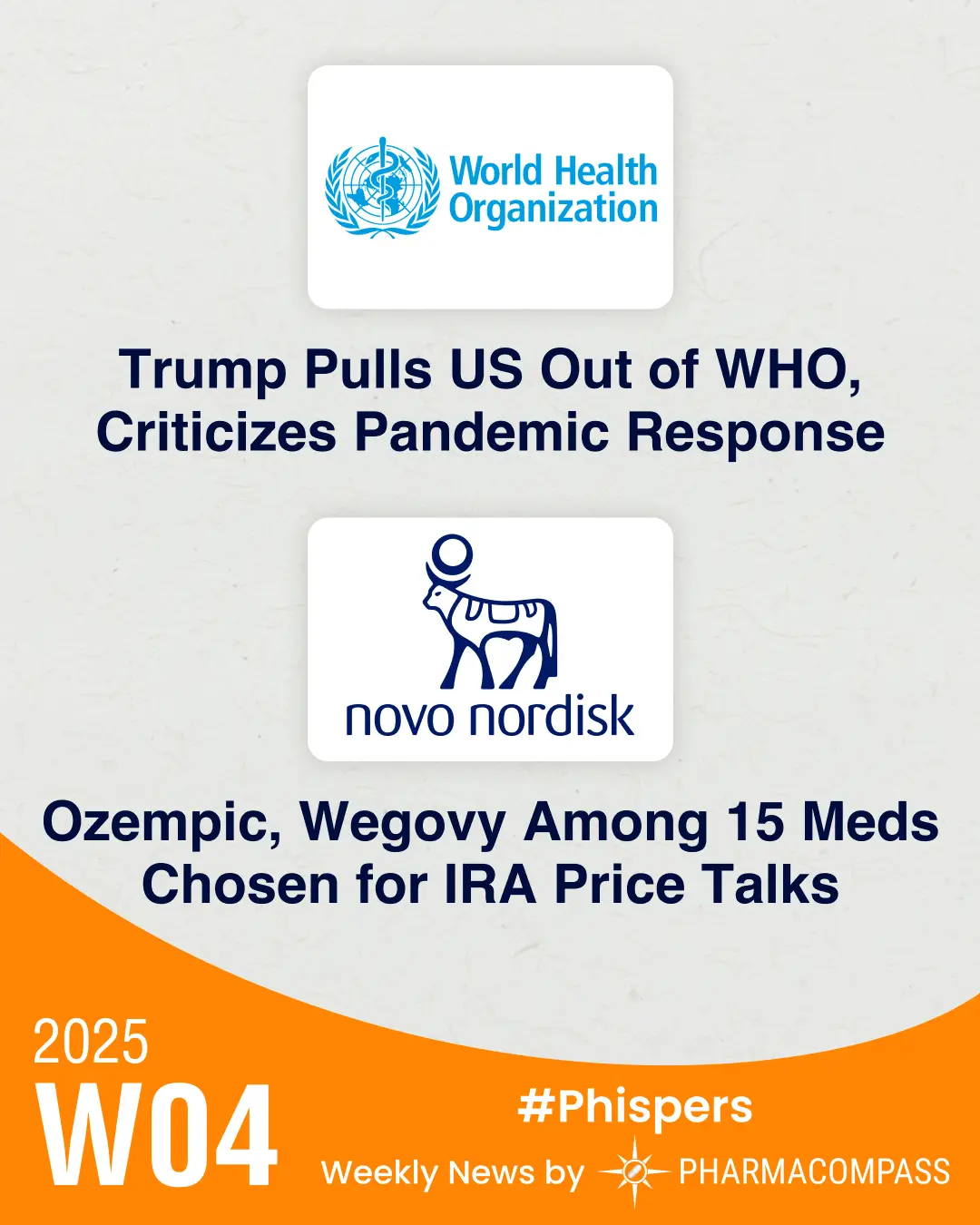
By PharmaCompass
2025-01-23
Impressions: 1,675 (Article) || 59 (Video)
On the day Donald Trump was sworn in as the 47th President of the United States, there was a deluge of some 200 measures, which included an order to withdraw the country from the World Health Organization (WHO). Trump also directed federal health agencies to pause all external communications. Both these measures have raised concerns within the public health community.
In its last days, the Biden administration chose 15 new drugs for Medicare price negotiations under the Inflation Reduction Act (IRA). This second batch includes Novo Nordisk’s blockbuster diabetes drugs, Ozempic and Rybelsus, and its weight-loss treatment Wegovy. Novo also revealed that a high dose of Wegovy led to an average weight loss of over one-fifth of the body weight in a late-stage trial.
The week also saw its fair share of drug approvals. FDA approved Johnson & Johnson’s ketamine-derived nasal spray, Spravato, as the first and only standalone treatment for adults suffering from treatment-resistant depression. AstraZeneca and Daiichi Sankyo’s antibody-drug conjugate (ADC), Datroway, was approved for HR-positive, HER2-negative breast cancer. Amgen’s combination therapy for colorectal cancer also bagged FDA approval.
In deals, ArriVent BioPharma inked a US$ 1.2 billion license agreement with Lepu Biopharma for a promising ADC targeting gastrointestinal cancers.
Trump signs order withdrawing US from WHO, accuses agency of mishandling Covid
The US President Donald Trump has signed an executive order to withdraw the US from the WHO, stating that “World Health ripped us off”. The executive order accuses WHO of mishandling the Covid-19 pandemic, failing to act independently from the “inappropriate political influence of WHO member states”, and requiring “unfairly onerous payments” from the US that are disproportionate to the sums provided by larger countries like China. The US has been the biggest contributor to the WHO’s budget, providing 18 percent of the current biennium budget for 2024-2025, which is set at US$ 6.8 billion.
The US is set to leave the United Nations’ health agency in 12 months. Trump has also rescinded an executive order issued by the Biden administration that aimed to establish safeguards for the development and use of AI, including its applications in healthcare and drug development.
US health agencies to cease external communication: In a surprising move, the Trump administration has directed federal health agencies, including the FDA, the Centers for Disease Control and Prevention (CDC) and Department of Health and Human Services (HHS), to pause all external communications, a report in the Washington Post said. This directive affects regular scientific reports, health advisories, updates to websites, and social media posts. The pause has raised concerns within the public health community, as these agencies routinely release critical information on food recalls, drug and medical device approvals, and updates on public health threats, such as infectious diseases and natural disasters.
Novo’s Ozempic, Wegovy among 15 new drugs chosen for price negotiations under IRA
The outgoing Biden administration announced that it has selected 15 drugs targeted for Medicare price negotiations under the IRA. This marks the second batch of prescription drugs for negotiations aimed at reducing costs for Medicare beneficiaries.
Novo Nordisk’s blockbuster diabetes drugs Ozempic, Rybelsus, and weight-loss treatment Wegovy (all semaglutide) are among the drugs identified. The selected drugs, which also include Pfizer’s cancer drugs Ibrance (palbociclib) and Xtandi (enzalutamide), GSK’s asthma and COPD treatment Trelegy Ellipta, and AbbVie’s irritable bowel syndrome drug Linzess (linaclotide) and major depressive disorder (MDD) treatment Vraylar (cariprazine), accounted for about US$ 41 billion in Medicare Part D gross spending between November 2023 and October 2024.
Novo touts increased weight loss results for high-dose Wegovy: Novo Nordisk has announced phase 3 trial results that point to increased efficacy of a high dose Wegovy in attaining weight loss. In 72 weeks, the 7.4 mg dose of Novo’s obesity drug led to an average weight loss of over one-fifth of the body weight (20.7 percent). In comparison, the 2.4 mg dose resulted in 17.5 percent reduction in body weight, while the placebo resulted in 2.4 percent weight reduction. Additionally, 33.2 percent of patients on the highest dose achieved a weight loss of at least 25 percent, compared to 16.7 percent on the 2.4 mg dose
J&J’s Spravato becomes first FDA-approved standalone med for treatment-resistant depression
FDA has approved J&J’s nasal spray, Spravato (esketamine), as a standalone treatment for adults suffering from treatment-resistant depression (TRD), a severe form of major depressive disorder (MDD) where patients do not respond to at least two different antidepressants.
In a pivotal study, 22.5 percent of patients using Spravato achieved remission by week four, compared to just 7.6 percent in the placebo group. Patients experienced rapid and significant improvements in depressive symptoms, with some reporting relief within just 24 hours. Due to the potential risk of misuse, the drug will only be available through a restricted program.
Allergic reactions to MS drugs: FDA has warned of the risk of a rare, but serious, allergic reaction caused by the use of some multiple sclerosis drugs. These drugs now require a new boxed warning. Teva’s Copaxone is among the drugs impacted by the US agency’s warning.
Key AstraZeneca-Daiichi ADC wins its first US approval for breast cancer
FDA has approved Datroway (datopotamab deruxtecan or Dato-DXd), an ADC developed by AstraZeneca and Daiichi Sankyo, for the treatment of adult patients with unresectable or metastatic hormone receptor (HR)-positive, HER2-negative breast cancer. Datroway is the second ADC developed under the collaboration between AstraZeneca and Daiichi Sankyo, following the success of Enhertu (trastuzumab deruxtecan). The approval comes after a tough year with Dato-DXd failing multiple trials in 2024.
Amgen’s Lumakras combo greenlit for colorectal cancer: FDA has approved Lumakras (sotorasib) in combination with Vectibix (panitumumab) for the treatment of adult patients with KRAS G12C-mutated metastatic colorectal cancer (mCRC). This approval is for patients who have received prior fluoropyrimidine-, oxaliplatin-, and irinotecan-based chemotherapy.
ArriVent gains ex-China rights to gastro cancer ADC in US$ 1.2 bn deal with Lepu Biopharma
ArriVent BioPharma made strides in its ADC pipeline by securing an exclusive license agreement with Lepu Biopharma for MRG007, a preclinical ADC targeting gastrointestinal cancers. This deal, valued at US$ 1.2 billion, includes US$ 47 million in upfront and near-term milestone payments. It grants ArriVent the rights to develop and commercialize MRG007 outside of Greater China.
The PharmaCompass Newsletter – Sign Up, Stay Ahead
Feedback, help us to improve. Click here
Image Credit : Phisper Infographic by PharmaCompass license under CC BY 2.0
“ The article is based on the information available in public and which the author believes to be true. The author is not disseminating any information, which the author believes or knows, is confidential or in conflict with the privacy of any person. The views expressed or information supplied through this article is mere opinion and observation of the author. The author does not intend to defame, insult or, cause loss or damage to anyone, in any manner, through this article.”








